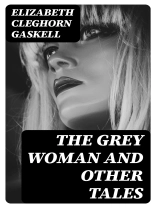In ‘The Grey Woman and Other Tales, ‘ Elizabeth Cleghorn Gaskell masterfully weaves a collection of Gothic narratives that explore themes of societal constraints, female identity, and moral dilemmas. Each story is infused with Gaskell’s hallmark psychological depth and social commentary, employing a rich, descriptive prose style that vividly captures the complexities of her characters and their circumstances. Against the backdrop of Victorian England, Gaskell delves into the shadows of domestic spaces, rendering an atmosphere that oscillates between the eerie and the profoundly human, making this collection a compelling reflection of the era’s anxieties and aspirations. Elizabeth Cleghorn Gaskell was a prominent novelist, biographer, and social campaigner, whose works often highlighted the struggles of women in a patriarchal society. Her background, steeped in the realities of industrial life and her own experiences as a wife and mother, informed her keen insights into the female condition. Gaskell’s engagement with the social issues of her time, including the plight of the working class and women’s rights, served as fertile ground for the psychological and moral complexities encapsulated in these tales. This collection is highly recommended for readers interested in Gothic literature, feminist perspectives, and the social dynamics of the Victorian era. Gaskell’s adept storytelling, along with her nuanced portrayals of women navigating the challenges of their roles, makes ‘The Grey Woman and Other Tales’ a quintessential read that resonates with contemporary audiences.
เกี่ยวกับผู้แต่ง
Elizabeth Cleghorn Gaskell (1810–1865) was an eminent Victorian author known for her keen social observation and varied narrative style, reflecting the complexities of the 19th-century society. Born in London, Gaskell’s early life in Knutsford, Cheshire, informed much of her later work. Her textual contributions encompass industrial novels, such as ‘North and South’, which comments on the class divide, and ‘Mary Barton’, a poignant portrayal of Manchester’s working-class struggles. Her narrative versatility extends to Gothic tales, exemplified by the collection ‘The Grey Woman and other Tales’. This particular work showcases Gaskell’s ability to weave suspense and horror within her keen social commentary. Gaskell’s literary style often embodied the Dickensian ethos of highlighting societal issues, yet her portrayal of female characters and the domestic sphere was more nuanced and pioneering. Gaskell corresponded with other literary figures of her time, including Charles Dickens, under whose editorship she published several works in ‘Household Words’. Her biography of Charlotte Brontë is particularly noted for its detailed and empathetic portrayal of another leading female author of the era. Gaskell’s writing remains influential for its intricate characterization and its layered depiction of Victorian England, offering insights into both the oppressive social norms of the period and the emergent challenges to them.












